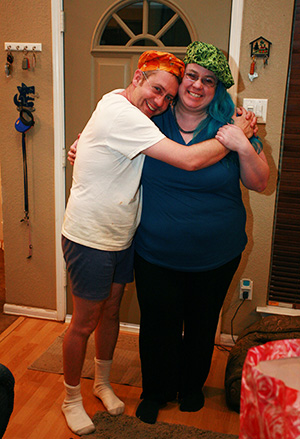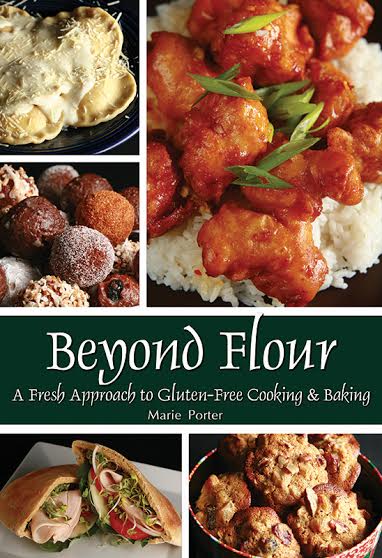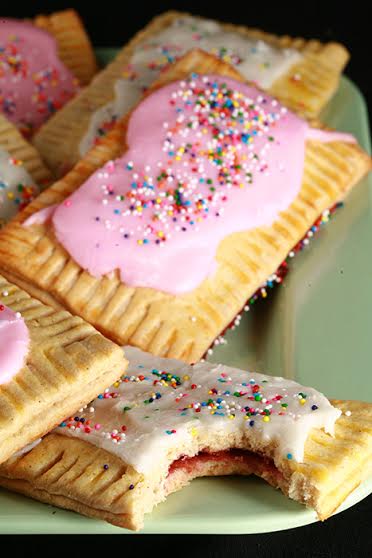 Years ago I was contacted by an anonymous person who was in the audition process for MasterChef. I doled out advice. After the season had run its course, I discovered who this mystery person was…and it was Marie Porter. We’ve since become good friends, and I find Marie to be one of the smartest and most intriguing people I’ve met. An astoundingly productive author, not just of cookbooks, Marie churns out what may be some of the best-researched cooking resources out there, thanks in large part to her superhuman superpowers, courtesy of Aspergers!
Years ago I was contacted by an anonymous person who was in the audition process for MasterChef. I doled out advice. After the season had run its course, I discovered who this mystery person was…and it was Marie Porter. We’ve since become good friends, and I find Marie to be one of the smartest and most intriguing people I’ve met. An astoundingly productive author, not just of cookbooks, Marie churns out what may be some of the best-researched cooking resources out there, thanks in large part to her superhuman superpowers, courtesy of Aspergers!
Ah…the gluten-free craze. Chefs don’t really know what to do with it. It tends to elicit eye-rolls and uneasy groans. And I’m not shy about stating that I’ve made a few of those groans and eye rolls, myself. Particularly since the godfather of the gluten-free movement, scientist and researcher Dr. Peter Gibson, revisited his original 2011 study that skyrocketed the gluten-free trend, and discovered that, in fact, gluten-sensitivity in people without an actual diagnosis of celiac disease (which is exceedingly rare) is actually a placebo reaction. Meaning…the vast majority of gluten-free dieters out there don’t really NEED to be avoiding gluten. It doesn’t actually make them sick. Their brain is convincing their bodies that it’s making them sick. (Not to downplay the situation faced by those who actually do have severe reactions when they do consume gluten. I have a friend who does occasionally indulge because she misses it so much, and is sick for several days after.)
But more recently, especially after my last trip to Burning Man where I cooked almost nonstop for 2 weeks for a variety of people with a long roster of dietary restrictions and preferences, I began to take on a different perspective on self-selected dietary restrictions.
I have MANY gluten-free friends. My mother is under orders from her doctor to avoid all wheat products. (Though I’m dubious of her doctor’s qualifications, I must admit.) These are people I love. And cooking for them brings me joy. And when I see what they often deny themselves to accommodate their gluten restriction, the fact that I can prepare something for them that’s delicious, and cooked with love, is an even more special way to honor and care for them.
So I’ve stopped looking at gluten free folks and paleo folks and vegans and vegetarians as a CHORE to cook for, and started thinking of it as a way to give them a meal that’s really exceptional, that they’ll never forget, and that they’ll be truly moved by. And how often do you get that kind of chance?
Marie has recently published what I believe is probably the single best gluten-free cookbook on the market, Beyond Flour…meticulously researched and tested…and I was so excited to read through it and test some of the recipes over the past few weeks. Marie’s goal was ambitious…she thought it should be possible, through just the right combination of a variety of flours, to achieve gluten-free versions of popular foods that were actually SUPERIOR to their wheat flour-based norms. And just as she always miraculously does…she succeeded. I’ve ordered some for Christmas gifts already, and used some of her recipes at my restaurant FRANK. And I asked her if she wouldn’t mind doing a guest post about her own gluten-free journey, which, as a professional baker and author of cake cookbooks, was a bit of an unwelcome surprise upon first diagnosis. Take it away, Marie!
……………..
 Murphy’s Law rules my life. This is something that I’ve known since I was
Murphy’s Law rules my life. This is something that I’ve known since I was
a little kid – seriously, Alanis Morrissette could write a whole sequel
to“Ironic” about my life. (Let’s face it, that song may not have
described irony in any way, but it sure was a Murphy’s Law anthem!)
Go visit New Orleans for the first time? Trip will be book ended with
tropical storms. Buy a house? Get smashed by a tornado just two months
after moving in.
No one that knew me was really surprised when I ended up diagnosed with a
gluten allergy, just MONTHS after opening a cake business.
Some people believe in guardian angels. As a woman of proud Irish
heritage, I like to anthropomorphize “Murph” as my guardian leprechaun.
He’s always there, mischievously throwing curveballs at me, taking me on
bizarre side adventures that I never asked for, or wanted.
This isn’t as negative as I’m probably making it sound. Those side
adventures usually end up being tremendous learning experiences, and end
up having silver linings. Murphy’s Law has taught me to be prepared for
anything – even completely bizarre, nonsensical things that could come up.
Life may give me lemons, but hey… I’ve gotten really good at making
lemon curd!
Walking down an empty Bourbon St one night in the heaviest rain I’ve ever
seen was a beautiful experience. Serene.. And one of my best memories of
the trip!
That tornado was definitely what I call a “character building experience”
– at first wryly, eventually warmly and wholeheartedly. I learned a lot
about myself, made friends, learned a ton of skills, and was even inspired
to write a memoir – Twisted: A Minneapolis Tornado Memoir – about the
whole experience.
When it came to the gluten allergy diagnosis, I really didn’t see how
there could be any silver lining in THAT one. Flour and I had always been
the best of friends! I could make ANYTHING with flour, and I did. Our
world was filled with the darkest, most beautiful roux, Sunday morning
bagels, homemade pretzels, and – of course – cake. In one minute, that
was all ripped away from me. I felt betrayed, and life lost a lot of its
colour for me, that day.
After trying a few recipes that were touted as being great – and finding
them all but inedible – I decided to just start developing gf recipes
myself. All my life, I’ve developed recipes from scratch – both cooking
and baking. I guess this could be another example of harnessing Murph.
I’m an Aspie. That is, I am firmly planted in the “Aspergers” section of
the autism spectrum. Some call it a disorder, I like to think of it as my
superpower… especially in the kitchen. Having ridiculously overdeveloped
senses may be annoying at times (bright lights, loud noises)… but it’s
a huge plus when it comes to cooking. I can tell when the peaches at the
grocery store are perfectly ripe, all the way from the deli section. I
can replicate pretty much any dish, just from taste and appearance. I can
smell when baked goods are ready to come out of the oven.
I bake like I cook, and vice versa. I’d never really seen a difference
between cooking and baking, and it’s only been recently that I’ve been
exposed to this idea that people are either cooks, or bakers. To me, all
cooking and baking is just chemistry and math… balance and proportion.
You need a good balance of flavours, body, acid, etc in cooking, you need
a balance of structure, leavening, etc in baking. I’ve always approached
it all in the same way I’ve approached logic problems – in my head.
“If Jenny is twice the age of Bob, who’s three years older than Sue…”
Really isn’t that far off from “I want to make a pizza crust, cannot have
gluten in it… but I want THESE properties”, in my mind. Baking gluten
free recipes from normal recipes by only swapping out the flour is akin to
trying to solve the age problem by plugging in the ages of Jennys, Bobs,
and Sues that you know in your life.
I decided to write a cookbook. Knowing that this would be an *expensive*
one to do right, I decided to crowd fund it.
Well, it’s been just over a year since Ben was kind enough to share news
of my Kickstarter for “Beyond Flour: A Fresh Approach to Gluten-Free
Cooking and Baking” on his Facebook page… and I’m here with an update!
 After the better part of a year experimenting and developing recipes, I’m
After the better part of a year experimenting and developing recipes, I’m
happy to say that the book was recently released… and I couldn’t be more
proud of the final product.
“Beyond Flour” has been the biggest book project I’ve ever taken on. It
was based around a HUGE premise – that gluten-free cooking doesn’t have to
be about compromising on texture or flavour. Of course, that’s something
that’s been *said* before, but the attempts I’ve seen to follow through on
it have been lacklustre. Gluten-free food still has a reputation of being
pretty awful for anyone isn’t gluten-free themselves.
I took the concept a step further – why shouldn’t gluten-free cooking be
as good OR BETTER than wheat flour cooking? There’s a huge variety of
alternative flours available, each with their own unique properties.. and
flavours! All of these flours have more nutritional benefit and flavour
that wheat flour, anyway – why shouldn’t we *all* make use of them?
As I see it, the main problem with gluten-free cooking and baking is the
desire to cut corners, and rely on “all purpose” gf flours… and that
just doesn’t work.
The thing is, using an all purpose mix for gluten free baking is kind of
like using one spice mix for flavouring everything you eat – savoury AND
sweet. Can you imagine that? While it’ll work on some things, it
definitely won’t be suited for others. Alternative flours are the same way
– some recipes call for more structure, some need more moisture retention.
Robust savoury flavours really lift some recipes… and for others it would
be overkill. By using different combinations of flours, you really let the
flavours and properties of those flours sing!
Once you give up on the idea of using an all-purpose flour mix, the sky
really is the limit! As an example, I can’t see ever using wheat flour to
bake cookies again, even for my non-gluten-free friends. The complex – but
fairly subtle, in some cases – flavours, the amazing textures… I’m pretty
sure that every cookie recipe in this book has wrecked me for the wheat
versions. I’m still shocked over the pitas that taste like JUST Jimmy
John’s bread – the loss of JJ was one of the saddest things for me, when I
had to go gluten-free. THAT recipe really made me feel like a miracle
worker!
Aside from the actual blends of flour, there were other considerations
when it came to formulating these recipes. Depending on the flours used –
and the end product desired – some recipes required different handling.
Sometimes it was more liquid. Sometimes it was resting time, or cooking
temperature. Sometimes, it would require a little extra support from
other ingredients – a little extra leavener, perhaps some extra protein
from the addition of an egg. The thing is, flour is only one ingredient.
Recipes aren’t about one ingredient, they’re about how multiple
ingredients AND techniques work together to create a whole. To merely
swap out the flour for a set of alternate flours is to ignore all of the
ways supporting ingredients – and techniques – can be utilized to create
something that you actually want to eat, rather than a mediocre facsimile
of what you REALLY want.
I had a great time working on this book! Logic problems, baby – the best
form of entertainment!
When Beyond Flour came out, I was touched at the sorts of reviews I was
getting. This one, in particular, made me CRY:
“When you find out you have celiacs you know you’re going to miss bread,
but you soon find out you miss other things so much more. For me it was
cinnamon PopTarts. Not that I had them all the time, but every time I had
one it was a rush of happy childhood nostalgia. Flipping through the book
I saw a recipe for toaster pastries and that was the first thing I made. I
did it just for fun. But when I bit into it, after not having one for over
a decade, I started crying. I can’t even express what a gift Marie has
given me. All these things I had written off – like ravioli and biscuits
and pita bread – I have it all back now. And the taste and texture and
AFTER TASTE are perfect. Not pretty good or not too bad … dead on. – Cara
S.”
So, today I’d like to share my recipe for gluten-free poptarts with you!
 Poptarts are one of those foods that satisfy that need for childhood
Poptarts are one of those foods that satisfy that need for childhood
comfort food every once in a while… even though they aren’t really that
good. It was interesting, how many people brought up Poptarts as one of
the foods they missed most!
Personally, I find these gluten-free toaster pastries are actually BETTER
than the source material.. and far better for you. Firm but slightly chewy
dough base, your choice of filling, and freshly made frosting. Garnish the
top any way you want – even sprinkles – and just have fun with it.
Gluten-Free Poptarts
Makes about 10
1 cup brown rice flour
1 cup sorghum flour
1/4 cup gluten-free oat flour*
1/4 cup coconut flour
2 Tbsp tapioca starch
2 tsp xanthan gum
1/2 tsp baking powder
1/2 tsp salt
2/3 cup sugar
1/2 cup butter, melted
1 tsp vanilla
1/2 cup milk
2 eggs, separated
1 batch filling (See below for recipe)
1 batch frosting (See below for recipe)
Preheat oven to 350 degrees. Line a cookie sheet with parchment paper.
Whisk together the dry ingredients until well combined. In a separate
bowl, whisk together all wet ingredients, except for one of the two eggs.
Add wet ingredients to the dry, mix until a thick dough forms. Wrap in
plastic, chill for 30 minutes.
Roll dough out to about slightly thinner than 1/4″ thick, cut into
3×5″ rectangles. Gather any scraps, needs to pull together, re roll
and continue cutting into rectangles until all the dough is used up.
Carefully arrange half of the rectangles on the cookie sheet, spaced
evenly. Evenly spread about 2 Tbsp of filling onto each of the rectangles
on the cookie sheet, stopping about 1/2″ from the edges. Top each
with one of the reserved rectangles, press the edges to seal. Use a fork
to press edges down.
Whisk egg together with 1 Tbsp cold water, brush over each pastry. Use a
fork to prick a few small holes in the top of each pastry to allow steam
to escape – this will help prevent filling from exploding out of the sides
as they bake
Bake pastries for about 15 minutes, until golden brown.
Cool completely before removing from the cookie sheet.
Spread frosting of choice onto pastries, garnish with sprinkles if using.
Allow frosting to dry fully, before transferring to containers or baggies.
Serve hot or room temperature, use or freeze within a few days of baking.
* If even certified gluten-free oat flour is not an option for you, use
1/4 cup of additional sorghum flour instead.
Fruit Filling
1 cup seedless jam of choice
1 Tbsp corn starch
Whisk jam and corn starch together until well combined.
Basic Frosting:
1 1/2 – 1 3/4 c. powdered sugar
2 Tbsp hot water
1/2 tsp vanilla extract
food coloring, if desired.
Whisk powdered sugar, water, and vanilla extract together – frosting will
be THICK. Microwave for 10-20 seconds to melt, stir until smooth. Tint
with food colouring, if desired.
Caution: Without the some of chemicals and stabilizers in store bought
PopTarts, the frosting on these ones is actually fairly heat sensitive: it
will melt when toasted. So, use in a toaster oven rather than a
traditional “pop up” style toaster… or turn your normal toast on it’s
side, and toast them frosting-side up…Keeping an eye out for drippage!
…..
A HUGE thanks to Marie for this utterly fascinating post and great recipe. Her perspective is so fresh and unique. Follow Marie on Facebook and Twitter and her fabulous Blog and you’ll get a lot more frequent, rich information than you get from me, that’s for sure!!
Leave a Reply
You must be logged in to post a comment.